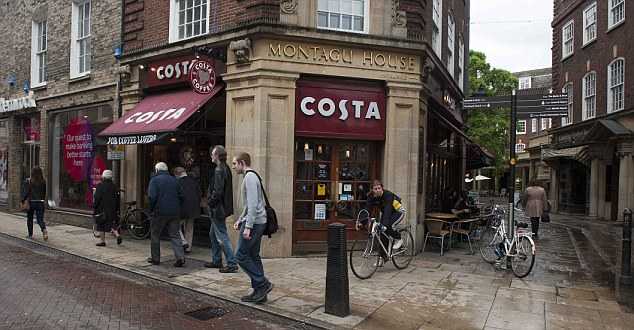LONDON, UK — British coffee lovers are expected to spend over £4 billion to get their caffeine fix in coffee shops this year, according to a new research led by market analyst Mintel. However, while coffee shop sales continue to thrive, annual growth has slowed from an impressive 9% in 2015, when the market was worth £3bn, to a respectable 3% in 2019, when it was valued at £3.9bn.
Facing competition at every turn, a quarter (26%) of Brits buy hot drinks from fast food chains such as McDonald’s, while one in five (22%) buy from a supermarket/store cafe such as Tesco or Ikea. Fighting its corner, one in six (16%) buy their hot drinks from traditional cafes. Overall, 19% of Brits have not bought a hot drink outside of the home in the last three months*.
Nevertheless, the enduring popularity of the high street coffee shop chain is highlighted in Mintel’s research, which found that almost half (48%) of UK consumers bought a hot drink at Costa Coffee in a three-month period last year. Starbucks ranked second at 30%, with fast-food chains in aggregate third at 26%.
The British love affair with popping out for a coffee began in the late 1990s when Starbucks arrived in the UK and made it cool, and Costa Coffee led the charge of the coffee shop on to high streets up and down the country.
“Coffee drinking came out of the home at scale,” says Jeffrey Young, the chief executive of coffee research specialists Allegra. “Drinking coffee became a lifestyle experience, there were branded cups, you could sit in and take your time.”
There are almost 26,000 outlets across the UK – from the main chains to independent coffee shops and cafes in supermarkets, service stations and retail stores – with the total market valued at more than £10bn. Costa is the biggest player, with 2,625 outlets, Starbucks has 995 and 1,048 of Gregg’s 2,000-plus stores fit the criteria of coffee shop, according to Allegra.
Trish Caddy, Mintel Senior Foodservice Analyst, said:
“Coffee shops have enjoyed robust growth in the past five years, benefitting from brands’ ability to meet consumer demands for the convenience of takeaway coffee and emergence of specialty coffee.
Continued growth is being boosted by more high street coffee shop brands expanding in the retail, travel, and leisure sectors.
However, the market continues to face tough competition from non-specialists such as fast food outlets and supermarkets; a situation which is not likely to ease as non-specialists continue focusing on price and convenience. With more food outlets selling low-cost coffee, coffee shops without strong food offerings will fall behind.”
Resurgence of popularity in out-of-home tea drinking
While coffee (80%)** is by far the most popular hot drink purchased out-of-home, tea has seen something of a resurgence as of late.
According to Mintel research, currently, 43% of consumers who drink hot drinks out of home drink tea, compared to 39% a year ago.
And while a nice ‘cup of rosie’ has a long history of solving the nation’s woes, the popularity of a cuppa has not escaped Millennials.
According to Mintel research, some 50% of Millennials (aged 20-39) drink tea out of home, compared to 40% of Baby Boomers (aged 55-73).
“The popularity of tea (in general) amongst Millennials is likely a reflection of the growing popularity of alternatives to the traditional cuppa. Speciality black, green and fruit/herbal/spice teas are particularly popular among 16-34 year olds. Many of the latest ingredient-focused tea-based drinks, such as matcha green tea and herbal teas that give added focus to flavour and a sense of occasion, suit young consumers. That’s not to say they’ve abandoned the classic cup of ‘builder’s tea’ as some 77% of Millennials drink standard black tea.”
British coffee lovers warm to the idea of charging for disposable cups
More than half (57%) of British coffee lovers agree that more coffee shops should charge customers a fee for using disposable coffee cups. Meanwhile, as many as 82% of customers agree that more people should use reusable coffee cups. Proving that coffee drinkers have a heart, 67% of consumers agree that it’s worth paying more for coffee from coffee shops that pay fair wages to coffee farmers.
“There is no doubt that disposable coffee cups have been an essential component to the convenience of takeaway coffee. In April 2019, the independent chain, Boston Tea Party, saw its sales fall by £250,000 across its 22 shops following its ban on single-use coffee cups last summer.
This suggests that a total ban on the use of disposable cups will alienate some coffee shop consumers who are motivated by the convenience of takeaway coffee in the first place. Conversely, our research shows that Brits respond to rewards, and operators can look to offer rewards to help change behaviour. The sandwich chain Pret A Manger, for example, introduced a 50p discount for customers who bring reusable coffee cups. Both cost savings and a positive impact on the environment give consumers even more reason to visit.”
* 3 months to Aug 2019
** of those who have bought hot drinks out-of-home in 3 months to Aug 2019


















